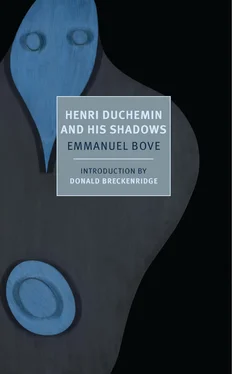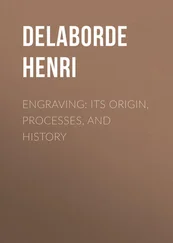It was eleven o’clock at night. A lamp without a shade lit my desk. I had not gone out all day. Whenever fresh air has not put color in my cheeks, I don’t feel at ease. My wrists are smoother and I notice, with some displeasure, that the down covering them is silkier, and when I go to bed, my unexpended energy makes me uncomfortable.
I was dozing in an armchair. At the seam where the red velvet meets the wood, golden tacks form a border. One of them was missing and, there, the edge sagged a bit. I sat motionless. My hand tugged at this seam without my being aware of it, as it sought unconsciously to pull out the next tack.
It was only once I had managed to pull it out that I became aware of what I was doing. I felt a small joy at this discovery, as I feel each time I catch myself doing something without realizing it, or when I bring to light a sensation in me of which I was unaware. It makes me as happy as a ray of sunshine or a kind word. Anyone who would criticize me for this tiny joy will never understand me. I think that seeking knowledge of oneself is a pure deed. To criticize me for digging too deeply into myself would be to criticize me for being happy.
I have to say, though, that this joy is very fragile. It really is not equal to the joy a ray of sunshine brings. Quickly it disappears, and I have to look for something else inside me to bring it back to life. Then, in the intervals, it seems that everything is hostile to me and that the people around me, with their simple joy, are in reality happier than I am.
* * *
I was reading when there was a knock at the door. It was my friend Paul. He rushed in and the door, which he had yanked behind him so it would close, stopped half- way.
“What’s the matter, Paul?”
“Nothing.”
His face was pale, and his eyes were darker than usual. He dropped onto the sofa, which he knew was soft.
“But what is it?”
He stood, walked around the room as I put my book down, and lit a cigarette, then sat again. He was smoking the way nervous people do, his cigarette drooping from his mouth. From time to time, he would spit out bits of tobacco.
“Please, Paul, tell me what’s happened to you.”
I looked at him. I tried to find a gesture, an expression, something in his bearing that would reassure me. But there was nothing. If he had been holding some object, his fingers would have trembled. He must have realized this because he avoided touching anything whatsoever.
“Paul, I’m your friend. Tell me everything. You know if there’s anything I can do for you, I’ll do it. It hurts me to see you like this, without being able to help you.”
He was so upset that I alone heard my words. I saw them drift over his head without ever reaching his ears. It seemed as if the words were balls that I was tossing haphazardly. I grew tired of his lack of concentration and stopped paying attention to what I was saying, and just then he appeared to listen to me.
Cautiously he drew near me. It was as if he were afraid that the slightest sound would close my mouth. He looked at it, blinking; his eyelids were missing a few lashes. The light from the lamp as it glided across the roundness of his eyes made their color fade. He burst out laughing. Yes, he burst out laughing. His fingers trembled one after the other, their thin fingernails molded to the flesh rather than sitting atop it. A few teeth I had never seen appeared at the back of his mouth, similar to the others but unfamiliar to me. They revealed physical mysteries. I was aware that I no longer had a friend in front of me, but a man like myself. And this did more to make me feel sorry for him than his desperate behavior.
“Why are you laughing?”
“Hmm! I don’t know, you’re right, I shouldn’t be.”
And he went on laughing. His nose seemed longer as the muscles of his face contracted. His mouth, which had lost the rhythm of his breath, was trying to recover. In spite of everything, Paul had to breathe through this confusion, and so his breath vibrated on his palate before escaping from his mouth.
At last he sat down, calmer, which made me wonder if his pain was as great as it had seemed.
A streetcar passed. Was it because the rain continued to fall that I thought, from the noise the streetcar made, that the electrical current was stronger?
There was a moment of silence. When the rumbling of a taxi interrupted it, I listened to the sound until it became imperceptible. And my concentration was so intense that I still heard it, even though it no longer existed. A pinkish light, projected from outside, lit up a spot on the wall where it would have been difficult to hang a painting.
My friend was not moving. Having parted his lips once and for all, he was breathing feebly, his tongue folded over so as to be out of the way. And his hair, which he had not combed with his hand, was untidy.
“Say something, Paul!”
His eyes left the comforting flame of the lamp, seemed to follow the flight of a bird, then landed on me. They were shrouded by a dark glaze, fringed by the shadow of his lashes. Perhaps because each eye was so intensely alive, I realized very clearly that there were two of them. As for my gaze, even though it was full of compassion, I felt it was not honest. As hard as I tried to open my eyes wide to see more clearly, it was hopeless. Paul took my hand. I questioned him.
“Tell me, what has happened to you?”
He leaned forward to take my other hand, which was quite far from him. He did it gently. Then he began to speak.
I did not hear the first sentences, as I was busy trying to find the mark of pain on my friend’s features. I placed more importance on that than on whatever he was about to tell me. For when a man is suffering, what can he tell us that we don’t already know?
“Jean, a great misfortune has just happened to me.”
Now he was calm. Beneath his thick clothes, one could see he wasn’t trembling. The circle of lamplight extended beyond us. We were sitting up in the middle of it, on the tangled shadows of the chair rungs.
“You know, dear Jean, how strong my attachment to you is. We met during the difficult days of war and from the start—and it had nothing to do with danger—we were attracted to each other. You would read me your letters. I read you mine. And we trusted each other enough not to hide anything. Sometimes we would get angry with each other and even though we both easily bear grudges, it never took us long to patch things up. We were true friends. And do you remember the demobilization? Do you remember our joy at finally being free? At the time, everyone’s happiness was so great that all our friends no longer even thought about friendship. But we weren’t like that. We had tears in our eyes when we parted. Do you remember? You came to Paris while I went to the South to join my fiancée. After only a few months, we met again by chance. How we celebrated that wonderful encounter! What a night! Well, my friend, in the name of this unblemished friendship I am asking you to listen to me. I want to believe that my presence in your home at this hour is not unpleasant for you. We have spent too many sleepless nights side by side for you not to want to spend one last night with me. It will be less dangerous than all the others, but much sadder. Before, we were waiting, hoping for something when we couldn’t sleep. Today, everything has changed.”
This preamble might seem affected. Obviously a man who is suffering, when he confides in a friend, does not go back to the beginning of the friendship that binds them. But ours is a very particular case. Paul and I, in truth, are no longer friends. We were friends only during the war. So it was natural for him to speak that night about what we had meant to each other in order to confer on the tenuous relationship we have today the significance it once had.
Читать дальше












